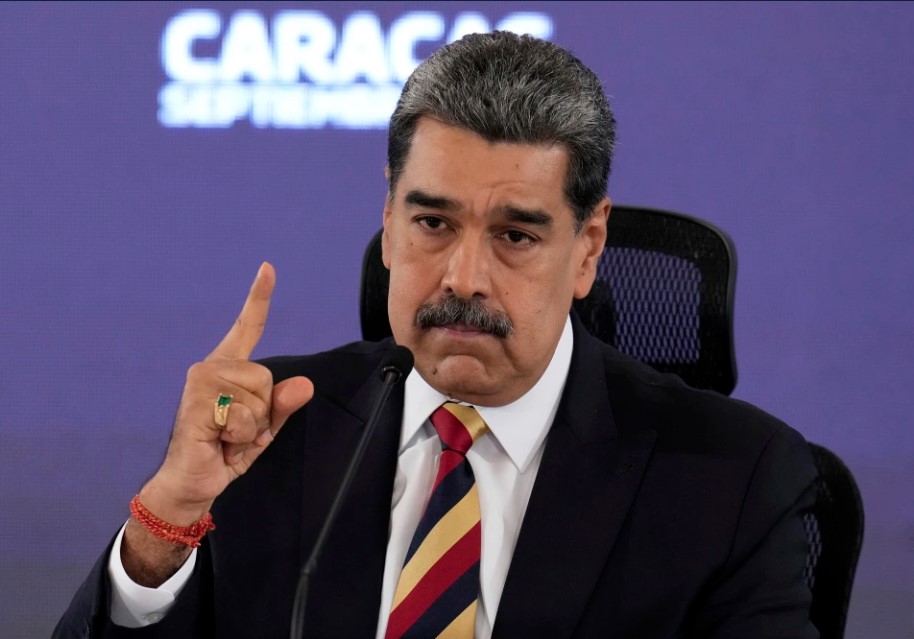Venezuelan President Nicolás Maduro has issued a strong warning against the United States after the U.S. deployed additional warships and forces in the Caribbean. On Monday, Maduro said he would “constitutionally declare a republic in arms” if Venezuela were attacked by U.S. military forces.
Maduro Warns of Rising Tensions in the Caribbean
The Venezuelan leader claimed that eight U.S. Navy vessels, carrying what he described as “1,200 missiles,” were targeting his country. He called the deployment “the greatest threat that has been seen on our continent in the last 100 years.” His statement came during a press conference where Maduro accused Washington of escalating military pressure on Venezuela.
The United States government, however, has said the buildup is aimed at stopping drug trafficking operations across Latin America. The Pentagon confirmed that U.S. forces are strengthening their maritime presence but has not announced any land invasion plans.
Venezuela blasts U.S. flotilla as “cannon diplomacy” with warships at its doorstep
In response, Venezuela has started deploying troops along its coastline and border with Colombia. Maduro’s government has also called on civilians to enlist in local militias, stressing the importance of preparing for any possible attack. “In the face of this maximum military pressure, we have declared maximum preparedness for the defense of Venezuela,” Maduro declared. He described the U.S. deployment as “extravagant, unjustifiable, immoral and absolutely criminal.”
U.S. Expands Military Presence Near Venezuela
Reports confirm that the U.S. Navy now has multiple powerful warships stationed near Venezuela. These include Aegis guided-missile destroyers such as the USS Gravely and the USS Jason Dunham, as well as the destroyer USS Sampson and the cruiser USS Lake Erie. The military presence is expected to grow further in the coming days.
Three amphibious assault ships are also set to arrive in the region. Together, these vessels carry over 4,000 U.S. sailors and Marines, according to a defense official speaking to The Associated Press.
The deployment follows instructions from then-President Donald Trump, who pushed for the military to target drug cartels he blames for fueling the fentanyl crisis and violence in the United States. Washington has accused Maduro himself of being involved in drug trafficking operations. In fact, the U.S. recently doubled the reward for Maduro’s capture to $50 million.
Venezuelan crude oil makes a stealth return — Chevron tankers dock in U.S. ports despite sanctions
Although Washington has not publicly threatened to invade Venezuela, Trump has reportedly directed the Pentagon to treat certain Latin American drug cartels as terrorist organizations. Out of the eight cartels labeled under this policy, one is Venezuelan.
Venezuelan officials, however, argue that the U.S. justification for its military deployment is misleading. Foreign Minister Yván Gil, citing a United Nations report, said that most cocaine trafficking — about 87% — moves out of Colombia through the Pacific Ocean, not through Venezuela. Only about 5% of the drugs reportedly pass through Venezuelan territory. “This false narrative threatens the entire region,” Gil told a meeting of Latin American and Caribbean leaders.
He warned that an attack on Venezuela could destabilize the entire continent. “Let us immediately demand an end to this deployment, which has no other reason than to threaten a sovereign people,” Gil said.
Maduro Faces Political Pressure at Home and Abroad
The military tensions add another layer to Venezuela’s already fragile political landscape. Maduro, who was sworn in to a third six-year term in January, has continued to insist that he was the legitimate winner of last year’s presidential election. However, evidence of widespread electoral irregularities has led many countries — including the U.S. — to refuse recognition of his presidency.
Since the disputed July 2024 election, Venezuela’s opposition has been increasing pressure on Maduro to step down. Opposition leader María Corina Machado recently expressed her support for the U.S. military deployment, calling it “the right approach” against what she described as a “criminal enterprise” ruling Venezuela.
Meanwhile, Maduro says his government maintains two lines of communication with the Trump administration. According to him, one channel is with the U.S. State Department, and another is with former envoy Richard Grenell. During his press conference, he criticized U.S. officials, referring to Secretary of State Marco Rubio as a “warlord” seeking regime change in Caracas.
US sends 4,000 troops and warships to southern Caribbean to target Venezuela cartels
Maduro also directly addressed Trump, warning him that any military attack would bring deadly consequences. “President Donald Trump, the pursuit of regime change is exhausted; it has failed as a policy worldwide,” he said. “You cannot pretend to impose a situation in Venezuela. If you attack Venezuela, your hands will be stained with blood.”
The dispute has placed Venezuela at the center of rising geopolitical tensions in Latin America. While Washington frames its actions as part of the fight against international drug trafficking, Caracas insists that the deployment is designed to intimidate and destabilize.
